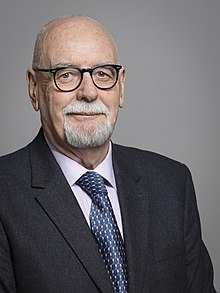| The Right HonourableThe Lord Sawyer | |
|---|---|
 Official portrait, 2019 Official portrait, 2019 | |
| General Secretary of the Labour Party | |
| In office 1994–1998 | |
| Leader | Tony Blair |
| Preceded by | Larry Whitty |
| Succeeded by | Margaret McDonagh |
| Chairman of the National Executive Committee | |
| In office 1990–1991 | |
| Leader | Neil Kinnock |
| Preceded by | Jo Richardson |
| Succeeded by | Tony Clarke |
| Member of the House of Lords Lord Temporal | |
| Incumbent | |
| Assumed office 4 August 1998 Life peerage | |
| Personal details | |
| Born | (1943-05-12) 12 May 1943 (age 81) Darlington, England |
| Political party | Labour |
| Occupation | Trade union official |
Lawrence Sawyer, Baron Sawyer (born 12 May 1943), known as Tom Sawyer, is a British trade unionist and Labour Party politician. He was General Secretary of the Labour Party from 1994 to 1998.
Early life
Sawyer was educated at Dodmire School, Eastbourne Comprehensive School and Darlington Technical College.
Career
Trade unions
Aged fifteen, Sawyer went to work on the factory floor of a Durham engineering works. He became a National Union of Public Employees (NUPE) Officer in 1971, becoming their Northern Regional Officer in 1975. In 1981, he was made Deputy General Secretary of NUPE and served through its merger to become UNISON until 1994.
The Labour Party
In his NUPE role he served as a National Executive Committee Member of the Labour Party between 1981 and 1994 and was elected to serve as its Chair from 1990 to 1991.
In 1994, Sawyer became General Secretary of the Labour Party and led the Party successfully into the 1997 General Election. He was a moderniser who helped bring about the New Labour era. He stood down at the 1998 Party Conference and was created a Life Peer as Baron Sawyer, of Darlington in the County of Durham on 4 August 1998. He is now a director of several companies and public sector bodies.
The Labour History Archive and Study Centre at the People's History Museum in Manchester holds the papers of Sawyer, which range from 1985 to 1998.
Other Positions
In 2005, Lord Sawyer became the chancellor of the University of Teesside, replacing former Conservative MP and member of the European Commission, Leon Brittan. Sawyer served in this role until 2017.
Sawyer has been a life-long admire of William Morris, the socialist writer and craftsman and in 2018 Sawyer began a five year term of office as President of the William Morris Society.
References
- ^ "A New President for the Society". The Blog of the William Morris Society. 15 March 2018. Retrieved 20 May 2022.
- Macintyre, Donald (9 September 1998). "How we all fought to end Labour's political corruption". The Independent. Retrieved 23 May 2017.
- "'Sheriff' hangs up his pager". BBC News. 2 October 1998. Retrieved 23 May 2017.
- "No. 55229". The London Gazette. 18 August 1998. p. 8994.
- Collection Catalogues and Descriptions, Labour History Archive and Study Centre
External links
- Announcement of his introduction at the House of Lords House of Lords minutes of proceedings, 14 October 1998
| Party political offices | ||
|---|---|---|
| Preceded byJo Richardson | Chair of the National Executive Committee of the Labour Party 1990–1991 |
Succeeded byTony Clarke |
| Preceded byLarry Whitty | General Secretary of the Labour Party 1994–1998 |
Succeeded byMargaret McDonagh |
| Academic offices | ||
| Preceded byLeon Brittan | Chancellor of the University of Teesside 2005–2017 |
Succeeded byPaul Drechsler |
| Trade union offices | ||
| Preceded byBernard Dix | Deputy General Secretary of the National Union of Public Employees 1981–1993 |
Succeeded byPosition abolished |
| Preceded byNew position | Deputy General Secretary of UNISON 1993–1994 With: Colm O'Kane and Dave Prentis |
Succeeded byDave Prentis |
| Orders of precedence in the United Kingdom | ||
| Preceded byThe Lord Bragg | Gentlemen Baron Sawyer |
Followed byThe Lord Harris of Haringey |